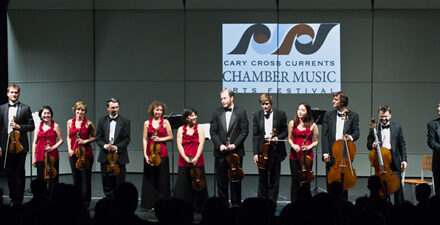Following a week of Independence Day Festivities, the North Carolina Symphony continued celebrating patriotism with 1812 Overture (formerly Russian Nights), the eighth concert in UNC Rex Healthcare’s Summerfest Series. In the same way that Independence Day is a celebration of America’s freedom and unique qualities, the music celebrated and recognized the unique qualities of Russia and its neighboring areas. Music by Shostakovich, Rimsky-Korsakov, and Glinka is colored by a great sense of patriotism and the composers’ connections to the lands around them. This patriotism adds a unique depth to Russian music and made for an engaging Summerfest program.
The concert opened with a piece full of classic Russian bravado. Dmitri Shostakovich‘s “Festive Overture” celebrates Russia’s October Revolution. The musicians played the piece with expected boldness, maintaining a full tone even during the markedly fast sections.
Next were two pieces that exhibited Russian patriotism through their clear reference is to groups neighboring the Russians. Russia is, as guest conductor Akiko Fujimoto put it, “a crossroad of cultures.” The influence of other cultures on Alexander Borodin‘s “In the Steppes of Central Asia” and on Mikhail Ippolitov-Ivanov‘s “Procession of the Sardar” from Caucasian Sketches is obvious. Both composers use different textures and melodies to portray settings and conspiring events. The English horn, with its intriguingly exotic melody, embodies the traveling caravan of Central Asians depicted in Borodin’s composition, while the percussionist, with tambourine and cymbal, ornamented the Persian military official’s procession described in Ivanov’s piece.
A definite highlight of the first half of the program was the orchestra’s performance of Nikolai Rimsky-Korsakov‘s Russian Easter Festival Overture. Expectant smiles jumped onto faces at the opening melody of the familiar piece. The melodies used by in this composition would have been easily recognizable to the Russian people, even at its premiere, having been drawn from a collection of Russian Orthodox liturgical chants called the Obikhod. Not a religious man himself, Rimsky-Korsakov’s musical references to the Obikhod and the celebration of Easter related to Russians not only in a spiritual sense but also nationalistically. The Obikhod and the celebration of Easter are integral parts of Russian tradition and all Russian listeners would have understood the meaning and images behind Korsakov’s composition. Thanks to a spot-on performance, the audience at Koka Booth was also able to hear and in a sense see the religious and nationalistic images within the music. The concertmaster captured the sacred beauty of the piece with his stunningly played opening solo. Each soloist and section of the orchestra played their parts with similar reverence and beauty, evoking images of an elaborate cathedral full of worshippers and of passionate Easter celebrations.
The second half of the program featured two pieces by passionately Russian composers inspired by one of the most distinctly Russian writers, Aleksandr Pushkin. Based on a Pushkin fairytale, Mikhail Glinka‘s opera Ruslan and Ludmilla tells of the rescue of Ludmilla from the clutches of an evil sorcerer. In this concert, the NC Symphony performed the overture to Glinka’s opera, thrilling the audience with the impressively fast opening and drawing them into the romantic scenes with more the lyrical melodies, warmly played by lower strings and woodwinds. Later, the waltz and polonaise from Pyotr Ilyich Tchaikovsky‘s Eugene Onegin were heard. Lighter than the pieces preceding it, these two upbeat dances provided a break from the intense drama of the rest of the program.
In between the Glinka and the Tchaikovsky was an excerpt from Aram Khachaturian‘s ballet Spartacus. “Adiagio of Spartacus and Phyrgia” takes place in the ballet after Spartacus and Phrygia escape the clutches of the Roman consul Crassus. Fujimoto described the piece as a “hymn to freedom” and went as far as to say that it was one of the most passionate pieces on the program. Indeed, a passionate yearning for and celebration of freedom is something that colors the compositions of many of the great Russian composers, including those of Aram Khachaturian. The tenderly played and deeply moving rendition of his adagio was the perfect build up to the concert’s epically patriotic conclusion.
Tchaikovsky’s “1812 Overture” is widely recognized as a patriotic piece due to its regular performance at Independence Day events, and it is the nationalistic energy of the piece that has incited standing ovation after standing ovation from audiences everywhere. With its references to the Eastern Orthodox religion, its inclusion of Russian folk music in a battle against the French, and the iconic firing of cannons (or striking of the bass drum in most instances) during the piece, the “1812 Overture” is a distinctly Russian composition in every sense. The orchestra embraced the energy of the piece, playing the opening hymn — a prayer for victory against the French — with a rich and reverent tone. The contrast of the quiet, worshipful moments with the pompously played militaristic anthem and the fearlessly bold battle scenes kept the audience on the edge of their lawn chairs. It was no surprise that immediately following the delightfully dramatic finale of the piece, the audience stood to their feet in a standing ovation.
Through the music on the program and the NC Symphony’s passionate performance of it, the audience came to better understand what it is that makes Russian music so distinct and powerful. The composers’ love of country shone boldly from every piece. Scheduling this concert after a week spent by Americans celebrating our own country helped to further drive the theme of nationalism that united this concert program. Next on the Summerfest 2019 schedule, the North Carolina Symphony along with the Chicago tribute band Brass Transit will explore the music of the band Chicago. Be sure to search CVNC‘s calendar for information about all remaining Summerfest concerts.












